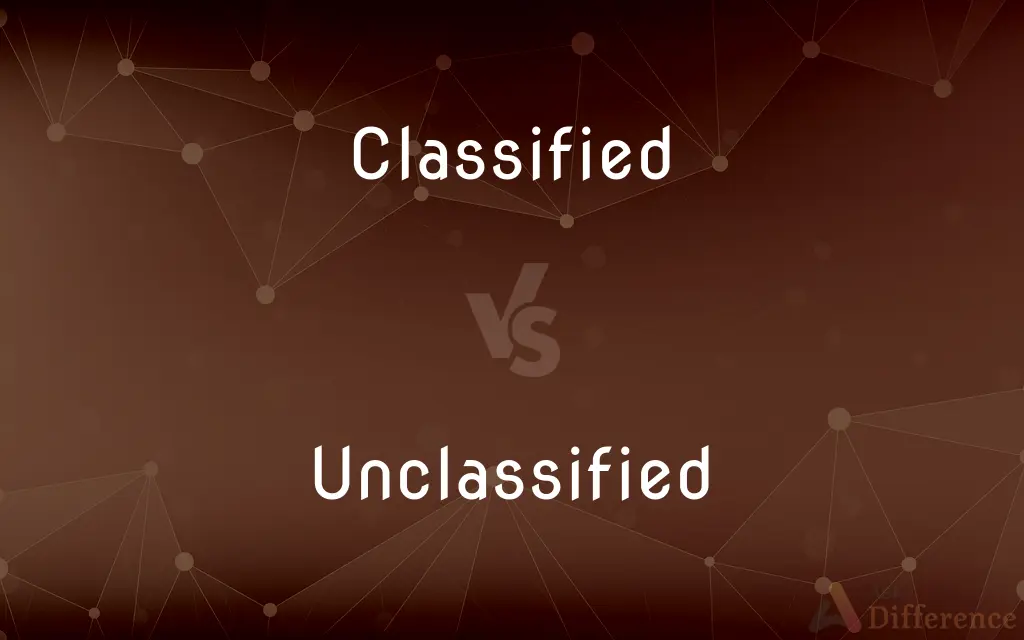Classified vs. Unclassified — What's the Difference?
By Tayyaba Rehman — Updated on September 19, 2023
Classified pertains to information deemed confidential and restricted; Unclassified refers to information without such restrictions.

Difference Between Classified and Unclassified
Table of Contents
ADVERTISEMENT
Key Differences
Classified information is deemed sensitive and can harm national security, individuals, or institutions if disclosed. Unclassified information, conversely, does not pose such risks and is often available to the public.
When data is Classified, it undergoes a careful process determining its sensitivity level, like top secret or secret. Meanwhile, Unclassified data is accessible because it lacks such sensitivity.
Accessing Classified information requires special permissions or clearances due to its confidential nature. In contrast, Unclassified information can typically be accessed without special permission.
The unauthorized disclosure of Classified material can lead to legal consequences, such as imprisonment. Unclassified material, however, has no such legal ramifications if disclosed.
While Classified details often pertain to national defense, foreign relations, or security concerns, Unclassified data is more general, covering topics not deemed confidential.
ADVERTISEMENT
Comparison Chart
Definition
Information deemed confidential and restricted.
Information without confidentiality restrictions.
Accessibility
Requires special permissions or clearances.
Can typically be accessed without special permissions.
Consequences of Disclosure
Unauthorized release can result in legal penalties.
Typically has no legal ramifications if disclosed.
Scope of Information
Often pertains to national security, foreign relations, etc.
Covers general topics not deemed confidential.
Public Availability
Not available to the general public.
Often available to the general public.
Compare with Definitions
Classified
Restricted to certain individuals or entities.
Only a few had clearance for the classified report.
Unclassified
Information without confidentiality restrictions.
The unclassified report was available online.
Classified
Information graded based on potential harm upon disclosure.
The data was classified as top secret.
Unclassified
Available to a wide range of people.
Most employees could view unclassified documents.
Classified
Information safeguarded against unauthorized disclosure.
The classified files were kept in a secured room.
Unclassified
Not safeguarded against general disclosure.
Unclassified data was shared in the meeting.
Classified
Unauthorized release can lead to penalties.
Leaking classified intel is a punishable offense.
Unclassified
Information without specific harm levels.
The details were unclassified and posed no risk.
Classified
Arranged in classes or categories.
Unclassified
Typically no legal consequences for disclosure.
She shared the unclassified info without worries.
Classified
Available to authorized persons only, as for reasons of national security
A classified document.
Unclassified
Not placed or included in a class or category
Unclassified mail.
Classified
A classified advertisement.
Unclassified
Of, relating to, or being official matter not requiring the application of security safeguards
Unclassified defense documentation.
Classified
Simple past tense and past participle of classify
Make sure all the field observations are classified by species.
Unclassified
Not classified
Classified
Sorted into classes or categories.
Unclassified
Simple past tense and past participle of unclassify
Classified
Formally assigned by a government to one of several levels of sensitivity, usually (in English) top secret, secret, confidential, and, in some countries, restricted; thereby making disclosure to unauthorized persons illegal.
We do not discuss specific interrogation techniques because they are classified information.
Unclassified
Not subject to a security classification
Classified
Not meant to be disclosed by a person or organization.
I won't say who I'm going to the prom with; that's classified.
Unclassified
Not arranged in any specific grouping
Classified
(informal) A classified advertisement in a newspaper or magazine.
He ran a classified for the tools he wanted to sell.
Classified
Arranged into classes or categories; as, unclassified.
Classified
Assigned to a class of documents withheld from general circulation; - of information or documents. Opposite of unclassified.
Classified
Arranged into classes
Classified
Official classification of information or documents; withheld from general circulation;
Thousands of classified documents have now been declassified
Classified
Information whose unauthorized disclosure could be harmful.
She had access to classified documents.
Common Curiosities
What does "classified" mean in the context of information?
Classified refers to information deemed confidential and restricted from general access.
Is all government data classified?
No, much government data is unclassified and accessible to the public.
How is classified data protected?
It's often safeguarded physically, digitally, and accessed only by individuals with clearance.
Are unclassified details always trivial?
No, unclassified info can be important but not deemed harmful if disclosed.
Can classified info ever become unclassified?
Yes, through a process called declassification, based on reduced sensitivity over time.
Why is some info classified?
To protect national security, individuals, or institutions from potential harm.
What's the risk of disclosing classified info?
Unauthorized disclosure can harm national security and lead to legal consequences.
Can unclassified details be protected?
Yes, for reasons like privacy or commercial value, even if not deemed confidential.
Can unclassified info become classified later?
Yes, if its sensitivity changes, unclassified info can be re-evaluated and classified.
How do individuals get access to classified info?
Through obtaining security clearances after background checks and need-to-know evaluations.
Are there levels of classified data?
Yes, including top secret, secret, and confidential, based on potential harm.
Is unclassified info the same as public info?
Not always. Unclassified info might still be restricted for other reasons, like privacy.
Who decides if info is classified?
Government agencies, using established criteria about potential harm.
Is all unclassified info safe to share?
While it lacks confidentiality restrictions, discretion might be needed based on context.
What happens if someone leaks classified info?
They could face legal consequences, including imprisonment.
Share Your Discovery

Previous Comparison
Footy vs. Footie
Next Comparison
Cryptic vs. ObviousAuthor Spotlight
Written by
Tayyaba RehmanTayyaba Rehman is a distinguished writer, currently serving as a primary contributor to askdifference.com. As a researcher in semantics and etymology, Tayyaba's passion for the complexity of languages and their distinctions has found a perfect home on the platform. Tayyaba delves into the intricacies of language, distinguishing between commonly confused words and phrases, thereby providing clarity for readers worldwide.













































